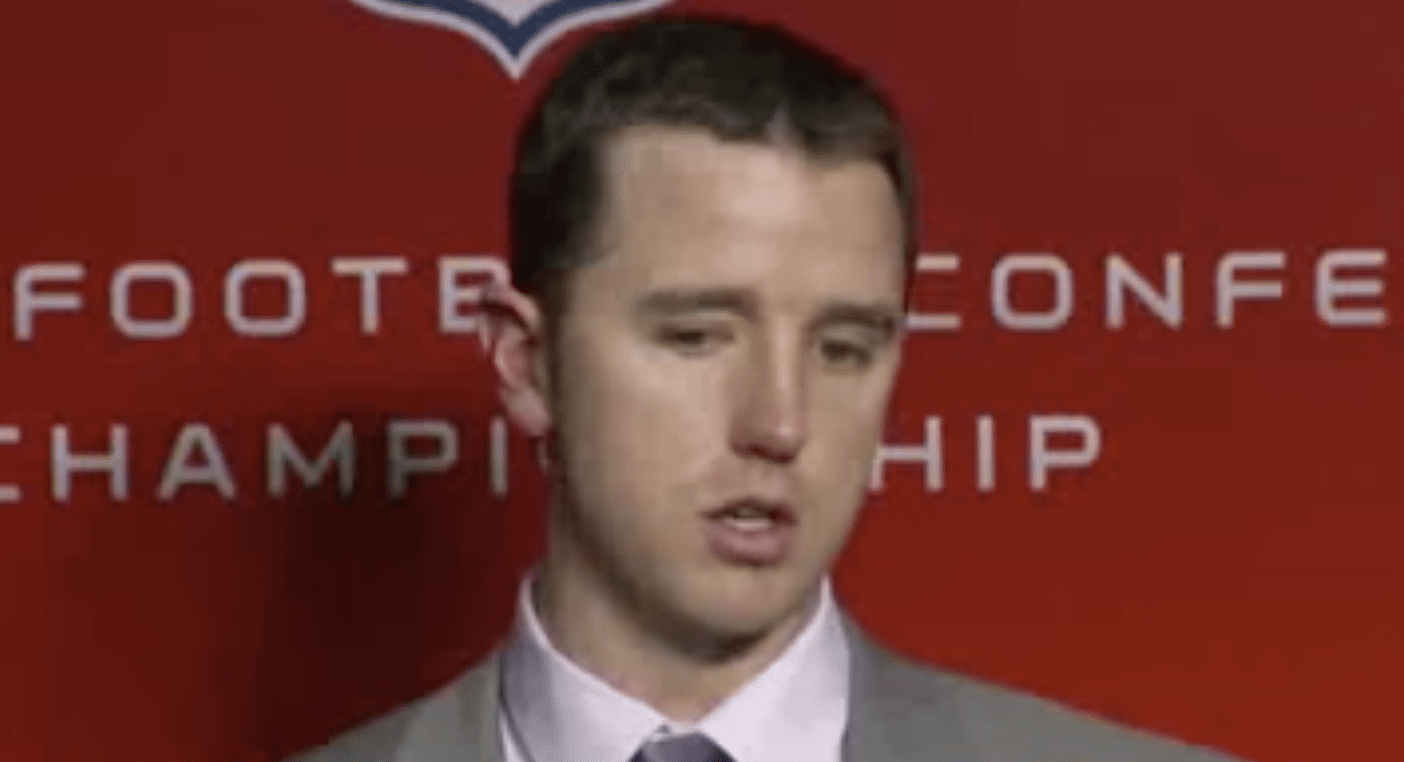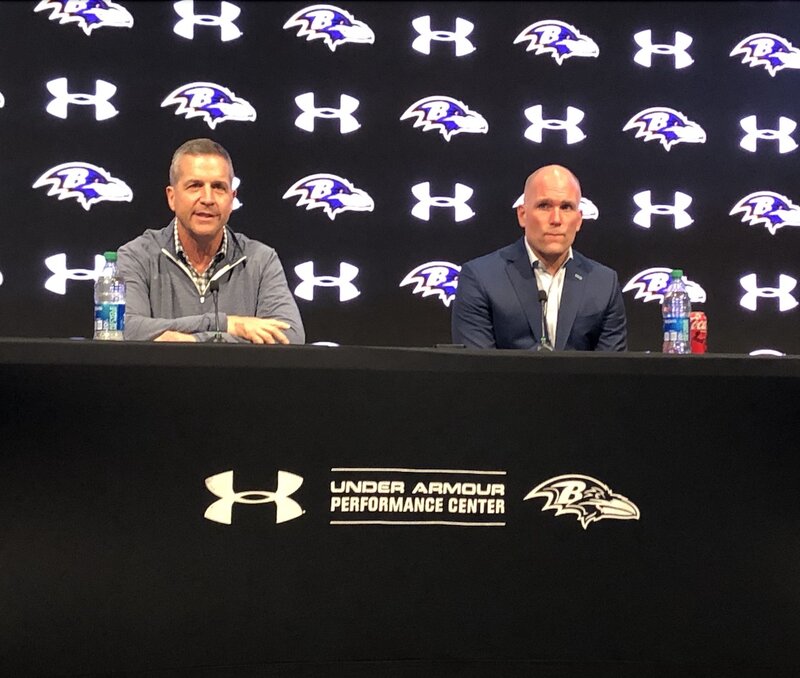“There’s really no way to accurately describe it or predict what it means. I’m never going to get over it. It’s never going to be OK.”
– John Harbaugh (March 2012)
ONE SPLIT SECOND. THAT’S ALL it took for New England Patriots defensive back Sterling Moore to swat the ball out of the hands of wide receiver Lee Evans in the southwest corner of the end zone at Gillette Stadium in Foxborough on January 22, 2012 in the waning moments of the AFC Championship Game.
The Ravens were a literally a blink of an eye away from going to the Super Bowl. Had Evans clutched the ball just a moment longer, the Ravens would’ve taken the lead in what was a 23-20 game with just 27 seconds left in regulation. Instead, a play later, as the play clock seemed to move at double speed and with head coach John Harbaugh still sitting on one timeout, Ravens kicker Billy Cundiff raced onto the field to kick what felt like an almost automatic 32-yard field goal that would tie the game and send it to overtime.
The chaos, the confusion, the play clock was winding, the indecision, the snap – it all happened so fast. There were 138 plays in the game and Ravens fans will only remember two of them: the Evans swat and drop and the Cundiff miss. The Cundiff field goal would’ve tied the game, but the Evans play was far closer to being successful and some replays, if slowed down enough, certainly looked like he had possession for an instant.
“Honestly, for a split-second I thought he caught the ball,” said Flacco. “I thought we were going to the Super Bowl. I threw the ball and I threw my hands up for a split second because I was taking my cue from guys on the sideline. Then I saw the referee signal incomplete.”
Flacco missed Dennis Pitta on the next play, and Cundiff raced onto the field.
“You don’t even think about the field goal,” Flacco said. “I turned as he kicked it and said, ‘Shit, that ain’t going in!’ What are you going to do? It’s over. You feel bad for a lot of your teammates. Lee Evans had a helluva game. I felt bad for him. That would’ve been awesome for him. And Billy won big games for us. They’re your teammates. You feel for them.”
Everything every person in the building had worked for all year was suddenly gone. All of their Super Bowl dreams had evaporated in what felt like a nightmare. After the ball sailed left to the screaming delight of New England Patriots fans – a kick that was so far to the left that it missed the net, falling into the hands of Patriots fans as a souvenir in the end zone lower seats — the Ravens walked off the frigid field amidst a sky of red, white and blue fireworks and confetti cannons. A team led by Bill Belichick and Tom Brady was headed to yet another Super Bowl, their fifth, this time with the Ravens playing the role of the foil left to answer the difficult questions about how it happened.
Flacco ended the day 22-for-36 for 306 yards and two touchdowns and once again was headed home for the fourth year in a row in January without a ticket to the Super Bowl.
Any Ravens fan can recall the ensuing sickness, the emptiness in the bottom of the collective gut of the Baltimore sports experience. Instead of a trip to Indianapolis – where there were even more civic demons for Baltimore fans to exorcise and the ghosts of Bob Irsay and the pilfered horseshoe – the Ravens found themselves in a depressed, somber locker room underneath the house that Bob Kraft built trying to explain what went wrong. For many it was all-too-familiar. For all of the key players – Harbaugh, Cameron, Flacco, Rice, Lewis, Suggs, Reed, Ngata – they had all been through this sad, sick ending four times together, every January in the cellar of a cold, funereal stadium in Pittsburgh, Indianapolis and now New England trying to answer the tough questions.
For Evans, a kid from Cleveland who played his college ball at Wisconsin, it was the end of the only playoff run he’d ever known and the biggest game and the biggest play of his life. Newsome wanted to draft him in the first round in 2004, but Evans was picked by Buffalo with the 13th overall pick. After playing seven years in Buffalo, he was curbed in a salary cut. Newsome gladly picked up the veteran Evans for depth on the 2011 team, which featured Torrey Smith as a rookie and only Anquan Boldin as a legitimate veteran starter. Now, Evans was sitting in the corner of the Gillette Stadium locker in full uniform staring blankly into his stall without a word to say and completely inconsolable. Teammates wanted to come over to offer any kind of encouragement to a guy who had caught nearly 400 passes in his career, but it was almost the consummate image of defeat, regret and finality. After a life chasing the dream of a Super Bowl and a championship ring, this was Evans’ last act in the NFL. His last memory will always be having a very catchable touchdown pass that he’d dreamed of as a kid swatted away amidst the roar of Patriots’ fans.
“To be honest with you, I felt like I had it, but it came out,” Evans said. “I mean, I don’t really know how to put it in words. The most disappointing part of this is that I feel I let everybody down. This is the greatest team that I have been on, and I feel like I let everybody down. It’s hard to sit here and accept how or why things happened, but it’s the reality. It was a great pass by Joe and it was just a pass that was not completed by me. Nobody else can take the fall for that.”
Meanwhile, in the media room Cundiff walked to the podium, like it were the gallows and answered every question, never wavering. “It’s a kick I’ve kicked probably a thousand times in my career,” he said. “And I went out there and I just didn’t convert. That’s just the way things go. There’s no excuse for it.”
And what did his teammates say to him?
“I got a lot of encouragement,” said Cundiff, who talked about his children seeing him lose with dignity even though the weight of the disappointment was written across his face. “I feel like this team, when you first arrive, is a tough group to get into, but you earn the respect of this team by playing well. I feel like up until this point, I’ve given guys a lot of reasons to believe in me and that things would come through. If anything, the disappointment is letting my teammates down. This is a team game. Ray [Lewis] has poured his heart out, and he’s had a long career, and you don’t know how many years he has left. To let him down is pretty tough.”






























